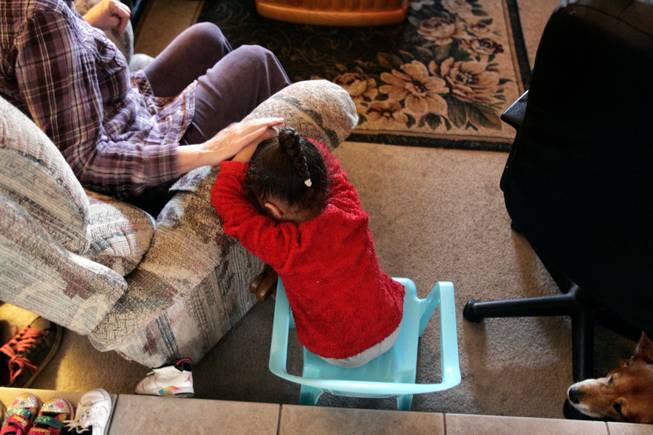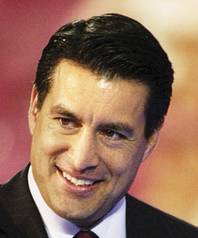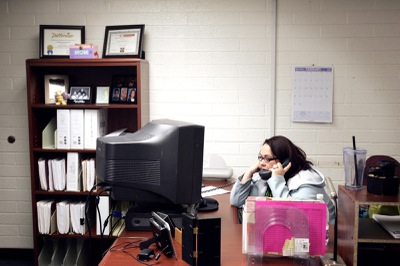
A 4-year-old girl sits next to her grandmother during a visit from Heather Richardson of Clark County Family Services.
Sunday, March 6, 2011 | 2 a.m.

Brian Sandoval
Beyond the Sun
Sun archives
- Republicans issue list of demands to be met before they'll talk taxes (3-3-2011)
- Democrats say Sandoval budget has $325 million hole (2-24-2011)
- Sandoval’s budget relies on at least one fee increase (2-10-2011)
- Gaming, mining industries become early targets for taxes (2-8-2011)
- Sandoval will need to write in loophole to pass budget (2-5-2011)
- Senior programs not spared from cuts in Sandoval budget (2-2-2011)
- Gov. Brian Sandoval’s budget means job, service cuts for Clark County (1-26-2011)
- State budget plan heavy on cuts, light on solutions (1-25-2011)
- Soft words during State of the State hide Nevada in pain (1-25-2011)
- Teachers not pleased with most of Sandoval’s speech (1-25-2011)
- In response, Democrats say taxes might be part of budget solution (1-24-2011)
- State of the State: How doors could open for Nevada (1-24-2011)
- Is Brian Sandoval’s ‘shared-sacrifice’ budget the solution to state’s economic woes? (1-23-2011)
- Most vulnerable await budget cuts with trepidation (1-23-2011)
- Increasingly worried liberals seek pushback on Sandoval budget (1-21-2011)
- Construction industry: Raise taxes for job growth (1-20-2011)
- Groups seek higher taxes on tobacco and gasoline (1-20-2011)
- Sandoval warns of consolidation, job losses in state government (1-19-2011)
Heather Richardson has one of her hardest cases yet. The 16-year-old boy has been exposed to deeply dysfunctional family relationships, drug abuse and domestic violence. He is a sweet kid, and clever, but he’s been witness to horrible things. Fate would seem to be urging him to jump into the same polluted pool. He blames himself for his family’s dysfunction, although he’s responsible for none of it.
Richardson, a senior case manager for Clark County Family Services, is trying to drill into him that he has free will, that he can make his own choices.
“You don’t have to be a victim of circumstance,” she emphasizes. “You were a victim, but now you’re a survivor.”
Over time, she’s built trust with the boy, who understandably trusts no one, but last week called her in a crisis for help.
“I’m happy you came into my life,” he says. “I don’t know where I’d be. I’d be dead.”
Before Richardson, he says he could never imagine life after age 20.
Richardson is uniquely qualified for her job with Family Services. At 13, she was taken from her family, spent a day at the county child shelter Childhaven and then lived with her aunt before reuniting with her mother.
Later, in 2003, she served as a foster mother for a year to two of her father’s children, then 9 and 15.
“I know what it’s like to know your parents have made bad decisions, but to still love them. I know what these kids are going through,” she says.
Now she keeps 23 families, all in various stages of crisis or recovery, under her care and supervision, trying to get parents back on the right track so they can be reunited with their children. In the approximately 40 percent of cases when it doesn’t work, she finds a safe adoptive home for the children.
On any given day, 3,000 children in Clark County are living outside their homes because they’ve been removed for their safety. Richardson is one of the frontline soldiers with the difficult and unheralded job of trying to figure out what to do next.
Just as these families are in crisis, county officials worry that state and local budget cuts will erase the gains made by Family Services since 2006, when the county had one of the worst child welfare systems in the country, as a federal official said at the time. Childhaven was overrun with 265 children, and caseloads were more than twice what is recommended by experts.
Under the proposed budget of Gov. Brian Sandoval, caseloads would balloon because the county would have to slash frontline staff by 22 percent, according to Family Services Director Thomas Morton, who testified at the Legislature on Friday about the effect of cuts.
This concerns Richardson, who is doing her best even though the tools she needs to do her job — mental health services and drug treatment beds — just aren’t there.
She begins her days early, getting her own family going. She and her husband have five children between them, ages 2 through 12.
She does a home visit on her way to work at Family Services on West Charleston Boulevard.
After answering e-mail and reviewing and typing case notes, she’s in a county vehicle to begin visiting families. She is required to see every child on her caseload at least once every 30 days.
At the first, two daughters have been removed from a home. The girls were abused by a foster family in another state after being taken from their mother. Richardson wonders if they are making the abuse allegation to get back with their mother.
(To comply with state privacy laws, the Sun agreed not to reveal names and to give limited information about families under Family Services supervision.)
“Kids want to be with their parents. If we can get the parents working on their issues, and get them reunited, then that’s my job,” Richardson says.
Every day, Richardson and the department have to confront two American instincts and try to reconcile them: On the one hand, we hold parental rights and familial autonomy sacred, while on the other hand, we want to protect innocent children from abuse and neglect.
The next house is a success. A woman who lost her mother at 13 became pregnant at 15 and has three children at 19. One of the children had been severely abused. The mother wasn’t at fault, but at the same time, she had clearly created an unsafe atmosphere for the children. The abuser is now in prison.
The young woman didn’t trust Richardson. But after months of battle, Richardson won her over. The young woman and her children live in a decent suburban neighborhood. She’s working toward a high school diploma.
As Richardson is leaving, the children embrace her, hugging her legs.
Richardson, who’s been working with families for three years and the department for six, earns a fairly modest salary, but the taxpayers are getting a great deal for the hours she works. She’s studying for a master’s degree at UNLV, which requires a 20-hour-per-week internship, which she’s completing, unpaid — for the county. She works at the Southern Nevada Children’s Assessment Center, which is, for lack of a better term, a one-stop shop for child abuse victims. She’s getting training in investigations and developing training programs for parents who have foster children who have been victims of sex abuse. So while raising her five children, she’s working 60 hours a week and getting paid for 40.
Some cases are easier than others. Amy has six children and lives in a clean, well-kept two story. Her children are smart and well adjusted, but she had something like a nervous breakdown after a boyfriend threatened her. She was taken to psychiatric facility, given some drugs and released.
“Even though she hit a bump in the road, her parental capacity is at a higher level than a lot of people,” Richardson notes. Even though Amy and her children are fortunate compared with other cases, it seems evident Amy suffers from an undiagnosed mental health issue, perhaps post-traumatic stress disorder from when she was abused as a child. At least, this is what a therapist told her when he gave her drugs and sent her on her way.
In fact, when you drive around on Richardson’s rounds, you come to realize that there’s an epidemic of undiagnosed and untreated mental illness in the valley, and little in the way of services to help people. Most of Richardson’s clients can’t get Medicaid, the federal/state health insurance program for the poor and disabled — Nevada has one of the stingiest of any state in the country. And for those without Medicaid, “Our mental health system is a nightmare.”
And so, very often, there’s nothing standing between Richardson’s clients and prison or death, except Richardson.
Even though the 16-year-old boy took a step back last week, Richardson knows he’s not lost. He’s still on track to be reunited with his mother, who has had her own rough road for nearly a decade. “It’s because I don’t give up. I tell him what he did wrong, but I don’t cast him aside like everyone else. My care for his safety and well-being are unconditional. There’s nothing he can do to change that.”


Join the Discussion:
Check this out for a full explanation of our conversion to the LiveFyre commenting system and instructions on how to sign up for an account.
Full comments policy